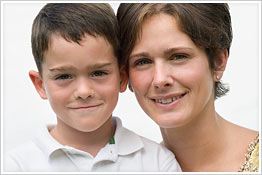Celebrating Motherhood
Hannah is an outstanding example of mothering qualities and abiding grace! She trusts God to care for both Samuel, her absent son, and herself, a long-distance mom.
By Caryl W. Krueger
Categories: Fatherhood/Motherhood, Hannah and Samuel, Motherhood Although this month features Mothers' Day, kids and adults should be celebrating motherhood every day, thereby gaining a more expansive understanding of that activity. To be sure, there are wonderful examples of motherhood in your family, your neighborhood, and the world community. But one that seems to embody all the best qualities is from the Bible and her name is Hannah.
 Hannah's story is plainly told in the opening chapters of 1st Samuel. Perhaps a Dad will want to read the story to the kids as a tribute to Mom. Simply put, Hannah and her devoted husband Elkanah have no children. On one of their yearly trips to the tabernacle at Shiloh, she prays for a child. Her petition is granted and Samuel is born. However, he is pledged to the temple when he is old enough to leave home. Undaunted by separation, Hannah still supports his growing years and when they visit him, she always has a new outfit for him - just the right size. Of course, we go on to see Samuel thrive and become a great leader. Hannah's story is plainly told in the opening chapters of 1st Samuel. Perhaps a Dad will want to read the story to the kids as a tribute to Mom. Simply put, Hannah and her devoted husband Elkanah have no children. On one of their yearly trips to the tabernacle at Shiloh, she prays for a child. Her petition is granted and Samuel is born. However, he is pledged to the temple when he is old enough to leave home. Undaunted by separation, Hannah still supports his growing years and when they visit him, she always has a new outfit for him - just the right size. Of course, we go on to see Samuel thrive and become a great leader.
These are some of the ways Hannah stands out as an excellent example of mothering.
- Hannah knew how to make home the center of family living. Eleven centuries before Jesus, she lived in Ephraim's territory. The house was of clay and stone, probably one big room with the family quarters at one end and animals at the other. But a full workday did not prevent her from fulfilling the requirements of Deuteromic law to utilize the open roof space for weaving, prayer, neighborliness, and family communication.
Every family today needs this important space!
- Hannah did not waste time being jealous of others. Her husband had a second wife, Peninnah, who had children. Hannah had none, but the two women worked together harmoniously and even happily. Hannah ignored the teasing Peninnah rather than giving in to the taunts. Not easy, but prudent in setting an example for the family.
- Hannah was an outdoors woman. She eagerly hiked to Shiloh, carrying the fruits of their harvest. She loved living outdoors for the eight day celebration and cherished this time to appreciate God's creation.
- Hannah was the first woman in the Bible who we know prayed. Elkanah asked when she was sad over her childlessness: "Am not I better than ten sons?" Although it wasn't common for women to enter the tabernacle, once she did sneak in to pray. The priest Eli heard her and said that God would grant her petition. How great that in her busy days, she confidently turned to God for true comfort!
- Hannah was joyful about putting Samuel's safety in God's hands when the time came for the little boy to live in the temple. She didn't fret over the unsavory activities that the priest's sons engaged in. Her parting prayer is called "The Song of Hannah's Triumph," a prayer that the mother of Jesus echoed - no doubt known from Mary's Old Testament training. Today, the words are called the Magnificat, a well-known musical masterpiece, and also used in hymns. You can read both (I Samuel 2 and Luke 1).
- Hannah always enveloped her son in love, even when apart. She had no way of knowing his changing height or size, but each year she made him a little coat to keep him warm in the cold temple. He could hug the coat around him as she would have hugged him in her arms. Year after year, she brought him the new embroidered coat composed of many little stitches, the many facets of her love.
- Hannah enjoyed a growing family, confident that her first born was going on to do great things. She later had three more sons and two daughters and together they made the yearly trips to Shiloh. She didn't cut them off from the world but let them learn from parental teaching and their own experiences.
We too can confidently place our most precious hopes in God's hands and trust the motherhood of God to bless both us and our children, whether they are near or far from us. |